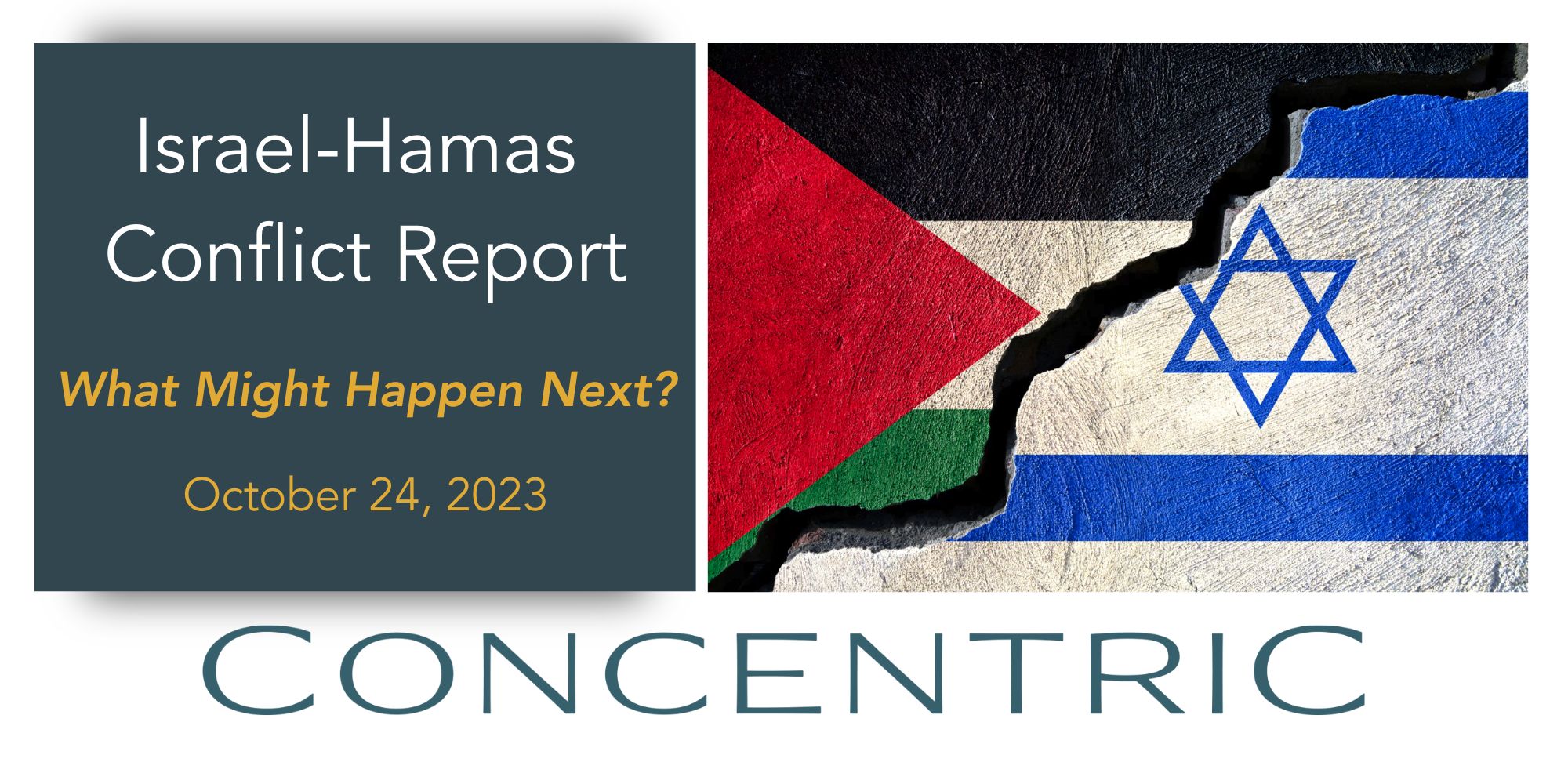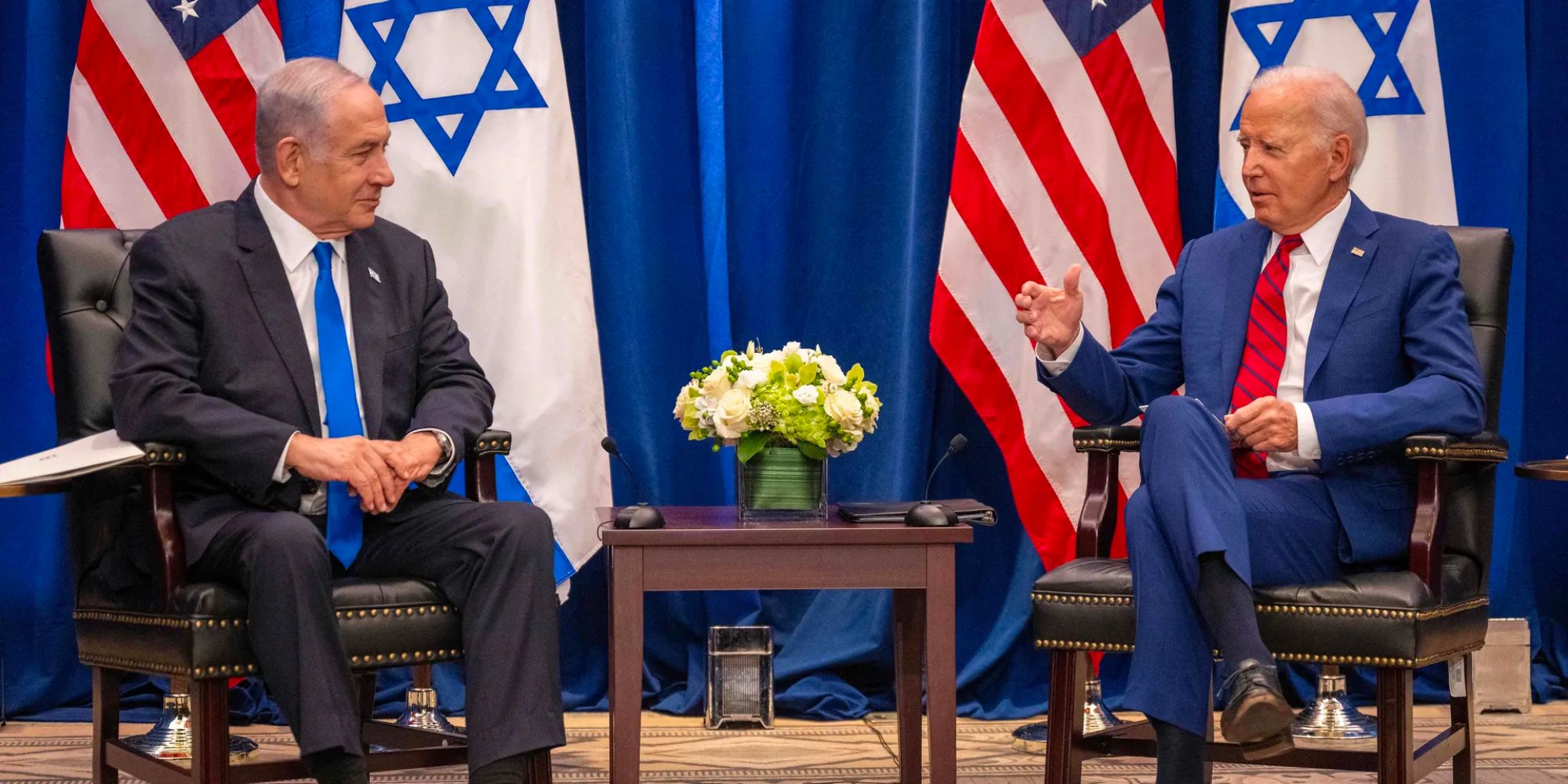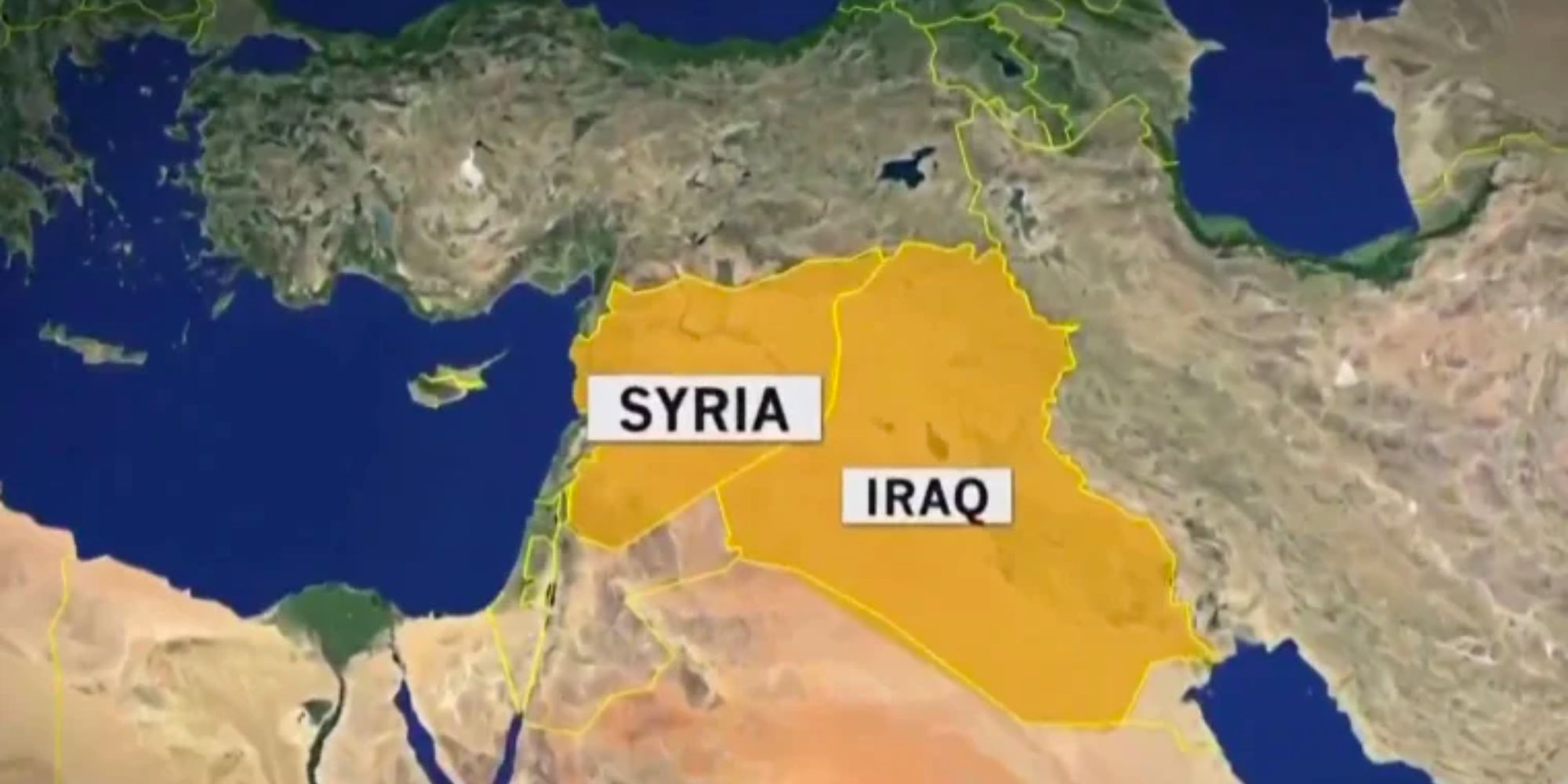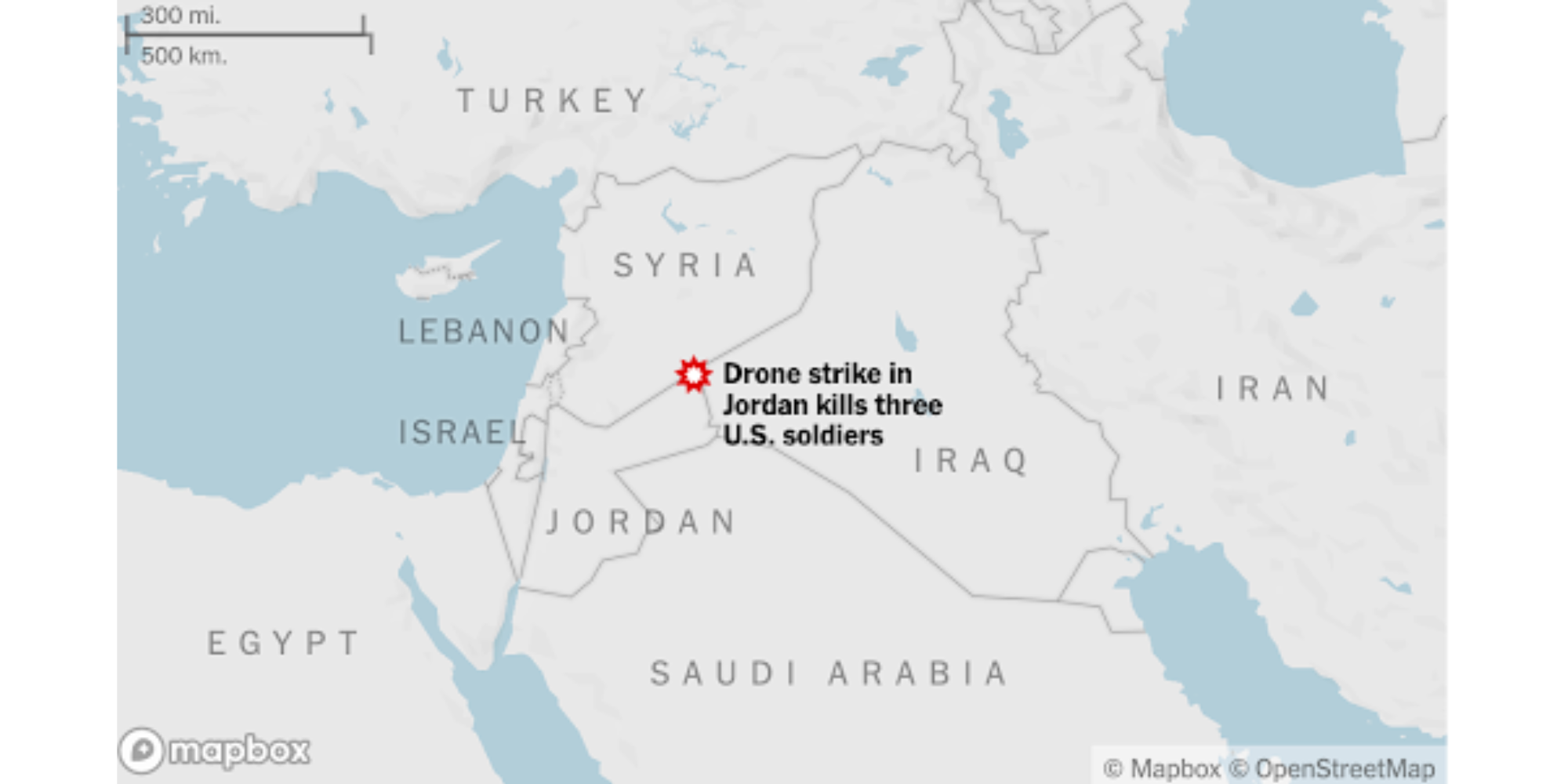WHAT MIGHT HAPPEN NEXT?
With the crisis between Israel and Hamas ramping up, Concentric examined several scenarios for the conflict over the coming weeks. We assess an Israeli military ground assault in Gaza with Israel not occupying the territory is the most likely scenario, but questions remain about how long the invasion would last, the role of regional players, and if the U.S. is drawn further into the crisis. Any of these wildcards can push the conflict in varying directions.
We judge the following scenarios are possible, in order of our assessment of most likely to least likely:
Most Likely:
- Ground Invasion in Gaza: We assess a ground invasion in Gaza by Israeli forces is the most likely near-term scenario in the ongoing crisis, as the Israeli military appears poised to launch a ground assault in the Gaza Strip at any moment. While the Israeli military has not announced their timeline for a ground assault, officials announced they are stepping up their bombardment of the Gaza Strip in preparation for the next stage of war. Israeli Defense Forces (IDF) have deployed 350,000 reservists and 170,000 active duty personnel to prepare for an attack along Israel’s borders. According to open source reporting, Palestinians said they received new warnings from the Israeli military to move to southern Gaza.
- Israeli Occupation Unlikely: Israel likely faces a long and hard fought campaign to defeat Hamas in the Gaza Strip. Israeli officials announced they have no plans to occupy the Gaza Strip and President Biden warned doing so would be “a big mistake.” Israel captured the Gaza Strip, along with the West Bank in the 1967 war, but it withdrew from the territory in 2005.
- While Israel controls most aspects of life in the Strip due to its ability to lockdown the territory, Israeli reoccupation would mean Israel is fully in charge of governance and providing basic services to the population.
- If Not Israel, Who? Although it does not appear likely Israel will occupy the territory, questions remain if Hamas is defeated, what entity will take over? The possibilities could range from Hamas’ political wing, to reinstating control of the Palestinian Authority, and a U.N.-led peacekeeping force.
- Hamas Political Wing: If Hamas’ military leaders are removed, their political wing might be able to retain control and rule the Strip. Since taking over Gaza in 2007, Hamas has shown little tolerance for political opposition. The group has never held elections, and political opponents are frequently arrested. Nonetheless, any government led by Hamas in the Gaza Strip almost certainly will receive support from Iran.
- Palestinian Authority: The Palestinian Authority could also assume control of Gaza, as the Authority administers semi-autonomous influence of the Israeli-occupied West Bank. Hamas ousted the internationally-recognized Palestinian Authority in 2007 in a violent takeover after winning the elections the previous year.
- International Peacekeeping Force: If Israel defeats Hamas, an international peacekeeping force might be needed in the Gaza Strip, at least in the short term. This force almost certainly will need support from the U.S., U.N., and regional powers. Unless the objective is the reinstatement of the Palestinian Authority in Gaza, Arab countries probably will be reluctant to participate in this process.
- Israeli Occupation Unlikely: Israel likely faces a long and hard fought campaign to defeat Hamas in the Gaza Strip. Israeli officials announced they have no plans to occupy the Gaza Strip and President Biden warned doing so would be “a big mistake.” Israel captured the Gaza Strip, along with the West Bank in the 1967 war, but it withdrew from the territory in 2005.
Possible:
- Multi-pronged assault along Israel’s borders: Israel remains focused on defeating Hamas in Gaza, but tensions are heating up between Israel and Lebanon, as well as with Hamas elements in the West Bank, threatening to further plunge the region into a larger military crisis. Although a wider regional war appears less likely in the coming weeks, the situation along Israel’s border is uncertain and could change rapidly, particularly if Hezbollah further tests Israel’s limits in northern portions of the country.
- Lebanon and Syria: Israel’s military remains focused on Gaza, but reportedly has discussed with U.S. officials the possibility of using military force if Hezbollah joins the fight. Since the war began, tensions between Israel and Hezbollah have increased with daily skirmishes along the Israeli-Lebanon border. Hezbollah has fired missiles into Israeli territory and the Israeli military has launched airstrikes against the group.
- West Bank: The conflict also appears to be spilling over into the West Bank as Hamas called on militants to take up arms. Israeli security forces reportedly detained 63 alleged “Hamas terror operatives” in military operations in the West Bank last week. More than 60 people, including children, have been killed in the West Bank since October 7, according to the Palestinian Ministry of Health. Even before Hamas’ attacks earlier this month, residents in the West Bank have witnessed an uptick in attacks –following Palestinian attacks on Israelis last year, Israel launched raids into the West Bank reportedly targeting militant strongholds. Attacks in the region left a record number of Palestinians and Israelis dead.
- Yemen: Yemeni Prime Minister Maeen Abdulmalik Saeed warned on Sunday that “Israeli ships in the Red Sea will be targeted” if IDF strikes on the Gaza Strip continue. Last week, the USS Carney, a U.S. Navy guided-missile destroyer in the northern Red Sea, shot down multiple missiles and drones launched by the Iranian-backed Houthis in Yemen, which the Pentagon said were potentially headed towards targets in Israel.
Least Likely
- Ceasefire: United Nations and European Union officials, as well as other regional and international leaders have called on an immediate ceasefire in the region, but given the current crisis, a ceasefire currently seems unlikely; at least in the near-term. A senior Israeli official said there will be “no ceasefire” in Gaza, and when asked whether Israel would pursue a path towards a Palestinian state after the Hamas attacks, President Biden said “not now.”
WILDCARD FACTORS
We assess there are several wildcards which could push the crisis into a number of directions. The role of regional players, the level of U.S. involvement, the role of China and Russia, and the political climate in Israel could have lasting impacts on the situation and help to chart the course for the region’s future.
- Role of regional players:
- Iran: Iran’s involvement in the crisis, including with multiple proxy groups throughout the region, is likely to play a key factor in any potential outcome. Iran continues to deny any involvement in Hamas’ attack against Israel, and Iranian officials have accused Israel of seeking “genocide” by forcing a siege against Gaza, according to Iranian state TV.
- Saudi Arabia: Saudi Arabia is “exerting maximum effort” to prevent an escalation of the conflict, according to Crown Prince Mohammad bin Salman. Despite moving closer to a landmark deal to normalize relations with Israel ahead of Hamas’ attack, Saudi officials have condemned Hamas, Israel, and the West for the current state of affairs, and slammed the “force displacement” of the people of Gaza by Israel. Saudi officials have privately stated talks on normalization between the two countries are paused, but not abandoned. Saudi officials almost certainly do not want to see a greater regional conflict which would threaten a series of “giga-projects,” called Vision 2030, which are set to stimulate broader economic growth and develop the Kingdom’s digital infrastructure.
- Egypt: Egyptian officials are under growing international pressure to allow humanitarian aid shipments into the Gaza Strip from the Rafah border crossing. Egyptian officials are concerned about the ongoing humanitarian crisis in the neighboring territory and the impact on their own country, particularly the possible influx of refugees. In Egypt, thousands of protesters marched through Tahrir Square on Friday in support of the Palestinians in Gaza. Although protests are generally illegal in Egypt, last week President Abdel Fattah al-Sisis said he could “call on the Egyptian people to come out and express their rejection” of Israeli actions in Gaza, and “you would see millions of Egyptians” in the street.
- Jordan: Jordanian officials are deeply concerned about the repercussions of Israeli actions in the Gaza Strip and the displacement of Palestinians, which they fear could destabilize their country due to their significant Palestinian population and limited resources, according to open source reporting. Jordan’s foreign minister said the war is “pushing the region to the brink,” and he said he would host a canceled summit between U.S., Egyptian, Jordanian, and Palestinian officials if everyone agreed to “stop the war, respect the humanity of Palestinians and deliver the aid they deserve.”
- Qatar: Qatari officials are working with the U.S. and other regional players to coax Hamas into releasing hostages, particularly women, children, and the elderly. Qatar has served as a longtime mediator in many hostage negotiations, particularly due to its extensive ties to militant groups, including Hamas. Qatar’s longstanding ties to Israel and the Palestinians probably will be further tested as the crisis drags on and solutions to the crisis are considered by regional and international officials.
- U.S. Involvement: While the U.S. is not committing troops on the ground in support of Israel’s war against Hamas, the United States is surging resources to the region, including deploying a U.S. Marine rapid response force to the coast of Israel, moving an aircraft carrier and attack ships to the Persian Gulf, and deploying advanced missile defense systems to the region. President Biden pledged solidarity with Israel and U.S. officials appear committed to ensuring hostages are released prior to a ground invasion of Gaza.
- Although it appears unlikely the U.S. will place boots on the ground, an attack against U.S. troops in the Middle East could force Washington’s hand to become more involved in the crisis. Secretary of Defense Lloyd Austin stated his concern about “the prospect of significant escalation of attacks on our troops and people throughout the region.”
- China and Russia: For China and Russia, the ongoing crisis could provide an opening for both countries to try to establish themselves as players on the world stage. Russian and Chinese officials have condemned attacks on civilians, urged a ceasefire, and offered to mediate, without explicitly decrying Hamas. Russian President Putin also condemned the U.S., stating Washington is playing “a destructive” role in the crisis.
- Last week during discussions at the U.N. Security Council, efforts to pass a resolution in response to the conflict were stalled by disagreements amongst members including the U.S., China, and Russia–all of whom wield veto votes. China and Russia probably will also balk at any future attempt to pass a U.N. resolution to establish a peacekeeping force in Gaza.
- China appears poised to use the opportunity to strengthen its influence in the region relative to the United States. China has maintained good relations with Israel, but has long supported the Palestinian cause. Beijing’s Special Envoy to the Middle East expressed concern about a widening conflict and called for an immediate ceasefire over the weekend. Nonetheless, China has limited success in serving as a global peacemaker as its proposal for a peace settlement in Ukraine has gained little traction, it faces ongoing political turmoil at home, and it has little experience in dealing with Hamas and managing Iran’s influence over the group.
- Russian Foreign Minister Sergey Lavrov warned the conflict risks spilling into a regional crisis and said efforts to pin blame on Iran were adding fuel to the fire, according to Russian state media. Russia proposed amendments to the failed draft U.N. resolution calling for an immediate ceasefire. Moscow has supported an independent Palestinian state, and has not labeled Hamas a terrorist organization. Russian President Putin also maintains a relationship with Israeli Prime Minister Netanyahu, despite policy clashes, including the war in Syria.
- Prime Minister Netanyahu’s Future Prospects: Any turmoil within the Israeli government is likely to place the Israelis in a weaker position when confronting multiple actors, and potentially a multi-pronged conflict. Netanyahu almost certainly will be blamed for Israel’s inability to stop Hamas’ attack, and his political future is likely in jeopardy, particularly if the conflict drags on for several months. According to a poll taken a few days after the attack, only 29 percent of the population deemed him qualified to serve as prime minister. For now no one is calling for Netanyahu to step down, but most Israeli governments have not long survived crises such as this one.
RECOMMENDATIONS
We continue to urge anyone with business interests in Israel and the surrounding regions to exercise extreme caution while events remain fluid, and to consider postponing any upcoming travel. We also urge travelers worldwide to avoid all demonstrations and maintain awareness of their surroundings, particularly in areas with protest activity.
- Protests continue throughout the globe as the U.S. State Department (DoS) is urging citizens to remain vigilant and curb travel to several locations, including Lebanon and Iraq. DoS issued a worldwide travel advisory on October 20, noting U.S. citizens should remain alert in locations frequented by tourists due to “increased tensions in various locations around the world, the potential for terrorist attacks, demonstrations or violent actions against U.S. citizens and interests.”
- We continue to recommend delaying travel in and around Israel, Egypt, Lebanon, Saudi Arabia, Qatar, and other portions of the Gulf as nearby countries almost certainly will be drawn further into the unfolding conflict. Travel in and out of the region almost certainly will be significantly delayed or disrupted.
- Many international airlines, including U.S. carriers, have suspended travel to and from Israel. Cruise and yacht operators also announced they would adjust itineraries in the region and would not be making calls to ports near Israel.
- We urge all travelers to remain vigilant as they might be targeted by individuals with perceived grievances regarding the current situation. Anti-American, anti-Jewish, and anti-Muslim sentiment is rising due to the ongoing crisis.
- We encourage all businesses–particularly tech companies, those with oil interests, and others in other energy related sectors–to keep a watchful eye on the unfolding crisis.
- We recommend companies based in Israel to continue taking steps to protect their businesses and employees. Corporations should consider evacuating staff from offices inside Israel or ask employees to work from home.
CONCENTRIC CAN HELP
If you or your business needs help in or around Israel, please reach out to Concentric’s experts for support. Concentric can provide:
- Emergency evacuation and secure transportation.
- Support from local and regional partners.
- Active monitoring and intelligence support, including tailored reports and briefings.
- Travel and risk assessments.
- Tailored security consulting.
- Executive protection agents.
- Cybersecurity and digital privacy protection.
If anyone is interested in a briefing with Concentric’s Chief Executive Officer Mike LeFever or a member of Concentric’s team on any of these topics, please do not hesitate to contact us.






